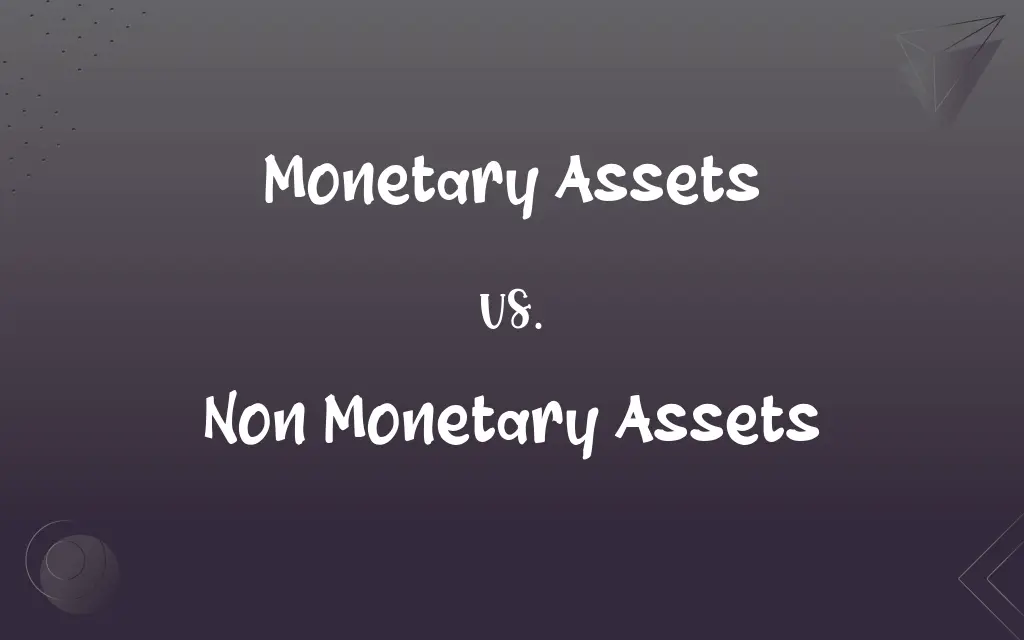Monetary Assets vs. Non Monetary Assets: What's the Difference?
Edited by Harlon Moss || By Janet White || Published on December 14, 2023
Monetary assets are financial resources with a fixed value in currency terms, while non-monetary assets are physical or intangible assets whose value may fluctuate.

Key Differences
Monetary assets, such as cash or bank deposits, have a fixed monetary value. On the other hand, non-monetary assets, like property or equipment, have a value that can fluctuate and is not fixed in monetary terms.
Monetary assets are highly liquid and easily convertible into cash. Whereas, non-monetary assets typically have less liquidity and require time or effort to convert into cash.
On a balance sheet, monetary assets are listed as cash or cash equivalents, while non-monetary assets include physical assets like land and intangible assets like patents.
The value of monetary assets can be eroded by inflation, while non-monetary assets may appreciate or maintain value over time, offering a hedge against inflation.
Monetary assets generally offer lower risk and return, suited for short-term needs. Non-monetary assets can have higher risk but potentially offer greater long-term returns.
ADVERTISEMENT
Comparison Chart
Nature of Asset
Financial resources with fixed currency value
Physical or intangible assets with variable value
Liquidity
Highly liquid, easily convertible to cash
Less liquid, conversion to cash may take time
Common Examples
Cash, bank deposits, government bonds
Property, equipment, intellectual property
Impact of Inflation
Value can be eroded by inflation
Can appreciate or maintain value against inflation
Risk and Return
Generally lower risk, lower return
Potentially higher risk, higher long-term returns
ADVERTISEMENT
Monetary Assets and Non Monetary Assets Definitions
Monetary Assets
Financial instruments easily convertible to cash.
Government bonds are considered monetary assets.
Non Monetary Assets
Equipment and machinery used in operations.
The factory's machinery is a key non-monetary asset.
Monetary Assets
Assets with a stable monetary value.
Certificates of deposit are part of their monetary assets.
Non Monetary Assets
Physical assets like vehicles or furniture.
Company vehicles are listed as non-monetary assets.
Monetary Assets
Cash held by a business.
The company's monetary assets include its cash reserves.
Non Monetary Assets
Intellectual property like patents and trademarks.
The company’s patents are valuable non-monetary assets.
Monetary Assets
Bank deposits with a fixed value.
Their monetary assets comprise significant bank deposits.
Non Monetary Assets
Assets not easily convertible to cash.
Art collections are considered non-monetary assets.
Monetary Assets
Liquid assets on a balance sheet.
The firm's balance sheet shows substantial monetary assets.
Non Monetary Assets
Real estate owned by an individual or company.
Their non-monetary assets include several commercial properties.
FAQs
What are monetary assets?
Monetary assets are financial resources that hold a fixed value and can be converted into cash, like cash itself, bank deposits, and government bonds.
Why are monetary assets important?
They provide liquidity for businesses and individuals, enabling them to meet short-term obligations and emergencies.
What is an example of a monetary asset?
An example is a savings account in a bank.
Are monetary assets subject to inflation risk?
Yes, their value can be eroded by inflation over time.
Can non-monetary assets appreciate in value?
Yes, many non-monetary assets, like real estate, can appreciate over time.
Are stocks considered monetary assets?
No, stocks are not considered monetary assets as their value fluctuates and is not fixed.
How do businesses use monetary assets?
Businesses use them for operational expenses, paying debts, and making investments.
How do non-monetary assets differ from monetary assets?
Non-monetary assets are not easily convertible to cash and do not have a fixed monetary value, unlike monetary assets.
Do monetary assets earn interest?
Some, like savings accounts and bonds, earn interest, but not all (like cash).
Can monetary assets lose value?
In terms of purchasing power, yes, especially in high inflation scenarios.
How are monetary assets valued?
Monetary assets are valued at their face value or the amount they can be converted into cash.
Do non-monetary assets generate income?
Some, like rental properties or patents, can generate income.
Can non-monetary assets be converted into monetary assets?
Yes, but usually not immediately or without potential loss in value.
What are non-monetary assets?
Non-monetary assets are assets whose value is not fixed in monetary terms and cannot be directly converted into cash, like property, equipment, and intellectual property.
What is an example of a non-monetary asset?
Real estate property is a common example.
How do non-monetary assets affect a company's balance sheet?
They are listed as long-term assets and can significantly impact the company’s net worth.
How are non-monetary assets valued?
They are often valued based on market conditions, appraisal, or the cost of the asset minus depreciation.
What role do non-monetary assets play in investment?
They are often part of a long-term investment strategy, offering potential for appreciation and diversification.
Are monetary assets the same as liquid assets?
Yes, monetary assets are a type of liquid asset, easily convertible into cash.
Are non-monetary assets subject to depreciation?
Physical non-monetary assets like machinery depreciate over time.
About Author
Written by
Janet WhiteJanet White has been an esteemed writer and blogger for Difference Wiki. Holding a Master's degree in Science and Medical Journalism from the prestigious Boston University, she has consistently demonstrated her expertise and passion for her field. When she's not immersed in her work, Janet relishes her time exercising, delving into a good book, and cherishing moments with friends and family.
Edited by
Harlon MossHarlon is a seasoned quality moderator and accomplished content writer for Difference Wiki. An alumnus of the prestigious University of California, he earned his degree in Computer Science. Leveraging his academic background, Harlon brings a meticulous and informed perspective to his work, ensuring content accuracy and excellence.






































































